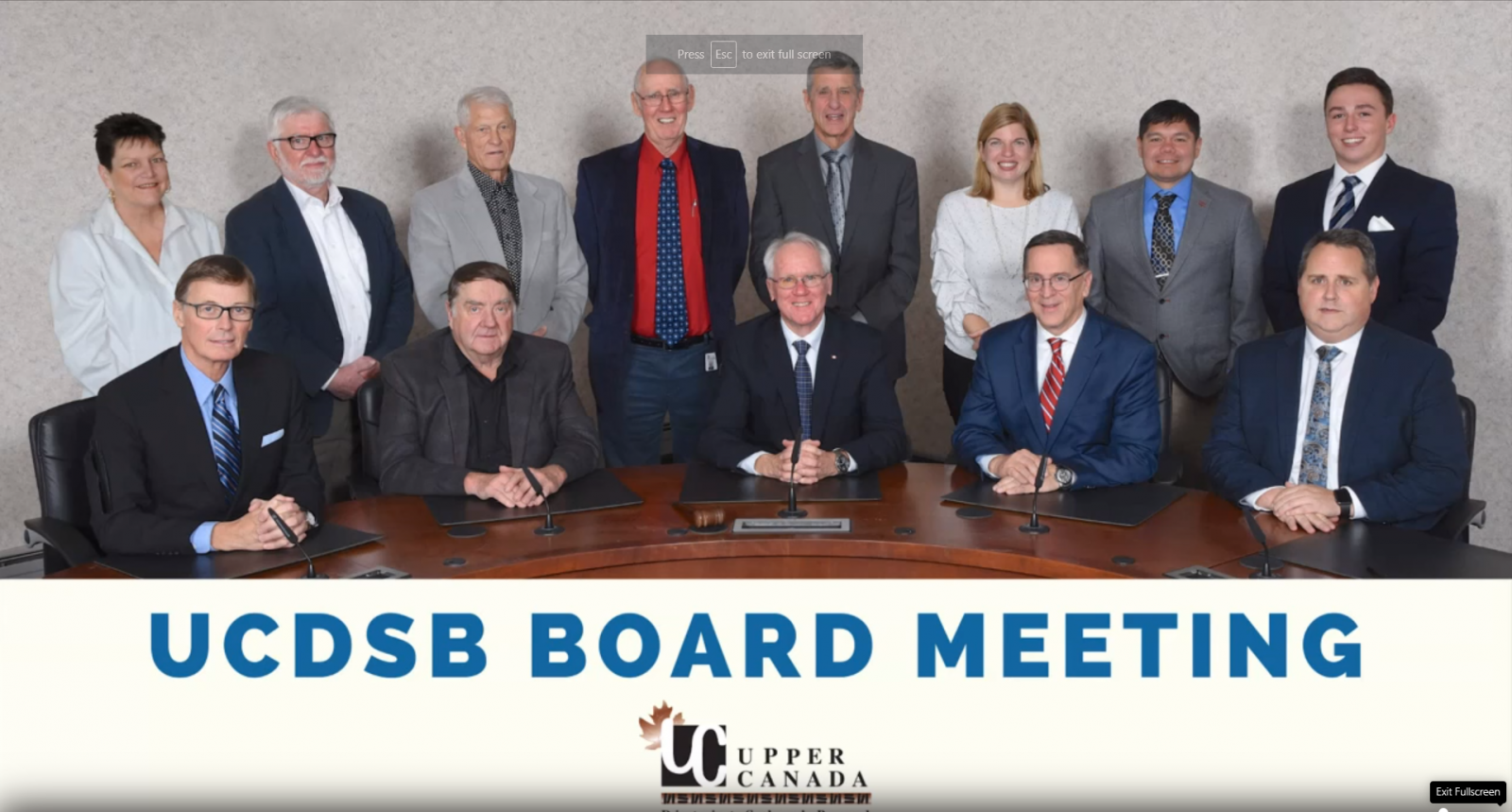BROCKVILLE, Ontario – A proposed plan by the province’s Ministry of Education to retain and expand the remote learning options put in place to cope with the COVID-19 pandemic has raised the ire of provincial school board officials, and local English-Public school board trustees alike.
“We have a great deal of issues on our plate with the pandemic but I feel we need to keep our eyes on the long game,” said Upper Canada District School Board Chair John McAllister at the April 7th trustee meeting. “This move could have a serious effect on local schools and their viability.”
Last month the Globe and Mail reported that the Ministry of Education was going to allow, if approved, parents to continue to enroll their child in full-time synchronous or two-way learning after the COVID-19 pandemic is over.
School boards would be able to continue offering virtual schools, but not receive further funding to cover administration costs.
Secondary school students would be able to sign up for online courses offered by a centre run by the province’s television broadcaster TVO, and its French-language service TFO.
Unions and school board associations, including the Ontario Public School Board Association, oppose the ministry’s plans, in part over fears of potential privatization of online delivery.
McAllister brought this to the forefront of the UCDSB meeting.
“As a school board, we believe our teachers know our students’ needs best,” McAllister said. “That is the essence of our present delivery model which keeps our kids connected to their teachers, their schools, and their administrators. The real time connection to local resources and supports is critical to student success and well-being.”
The current online model used by the UCDSB was developed to support remote students during the ongoing COVID-19 pandemic.
“It is not an ideal situation, and was never intended to be more than what it is – a contingency for program delivery during a pandemic,” he continued.
McAllister outlined the potential impact on small rural schools like Seaway District High School in Iroquois and Glengarry District High School in Alexandria.
“E-Learning could become a reality to the point where students will not have to take courses in-person, in-school,” McAllister explained. “And what this really means is that some of our small schools may close. I want our municipal leaders to know that because this is important.”
He added “if we do not have people in bricks and mortar schools, where I believe the best learning occurs, then we are in trouble.”
Trustee David McDonald (Ward 8) who is the UCDSB representative to the Ontario Public School Board Association, said that some of what was reported in the media is not accurate, or was not information that was to be disclosed to the public.
“The issues that were presented by the initiatives committee from the Ministry [of Education] was done so in confidence,” McDonald explained. “There is a lot of information out there, some of it is correct and some of it is still to be determined.”
He said that OPSBA, which represents the English-Public school boards in Ontario, has followed up with a submission expressing concerns about provincial changes.
“There is obviously some concern about what things will look like and how it gets rolled out,” he said. “All boards across the province have similar concerns to what has been raised tonight by Chair McAllister and this board.”
Trustee Lisa Swan (Ward 6) said she had serious concerns about the remote learning initiative.
“This is going to close more schools,” she told trustees. “I have serious concerns about this initiative for our students, for our staff, and for our parents.”
Trustee John McCrae (Ward 5) offered an opposing view, saying that school unions and OPSBA were “burying their heads in the sand” on the issue.
“The genie is out of the bottle. This online learning is out there and it’s going to be provided.”
He said it was incumbent on the boards to embrace online and remote learning, and use it.
“It will never replace in-class mentoring by a person who cares about students, but it’s out there.”
The board passed three resolutions. The first directed Chair McAllister to write a letter to Education Minister Stephen Lecce outlining the board’s concerns about the extension to e-learning.
Trustee John McCrea opposed that motion while the remainder of the board were in favour.
Trustees supported the second motion, which called for meetings with the wardens of the four counties that are served by the UCDSB. The meetings would share the trustees’ concerns about the impact of possible legislation for remote-learning and how “detrimental to small rural secondary schools” it could be. That motion was opposed by Cornwall trustee David McDonald.
“Not that I discourage conversation with our colleagues of municipal government – they tend to only want to talk to us when it is important to them,” he said. “However I think that’s fine but I am not quite certain that we want to go quite so formal route. At this point I think that there is still a lot of information that still needs to be shared.”
He added there is nothing preventing the chair of the board from having conversations with political colleagues at the municipal level already but he did not want to fuel the fire before all the details are out about the provincial plan.
“The appearance of an attack is not something I want to see right now,” he concluded.
The final resolution called on the province to call a Royal Commission into the future of education in Ontario before making significant changes to the school system.
“We have seen tremendous change in this province, some of it good and some of it not so good,” opined McAllister. “We need to define what the parameters of e-learning and remote learning are.”
McDonald cautioned against calling for a Royal Commission.
“[School boards] exist at the sole pleasure of the province,” he said. “When we start to have this dance, it comes with some potential ramifications.”
McDonald cited other moves by other provinces to eliminate or restructure school boards. Manitoba recently decided to eliminate publicly elected school boards. Quebec has eliminated French-language boards all together and restructured English boards into four entities that only have select elected positions.
“I think the sole purpose we have is to provide the local level initiatives to ensure that students are learning and where they are.”
He said that asking for a Royal Commission when the province is already looking at making some changes would ensure those changes would go through.
“I understand where Chair McAllister is coming from but I don’t just know if this is the right time for it, for what we are asking for.”
Trustees Larry Berry (Ward 7), and McDonald both opposed this motion.
This story was originally written for, and appeared in The Morrisburg Leader.




